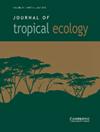Limited influence of experimentally induced predation risk on granivory in a tropical forest
IF 1
4区 环境科学与生态学
Q4 ECOLOGY
引用次数: 0
Abstract
Seed predation by rodents can strongly influence plant recruitment and establishment. The extent to which predation risk indirectly alters plant survival in tropical forests via impacts on granivory is unclear, making it difficult to assess the cascading impacts of widespread predator loss on tree recruitment and species composition. Experimental field studies that manipulate predation risk can help address these knowledge gaps and reveal whether antipredator responses among small mammals influence plant survival. We used camera traps and seed predation experiments to test the effects of perceived predation risk (via predator urine gel) on foraging behaviour of and seed removal by murid rodents in an unlogged and unhunted rainforest in Malaysian Borneo. We also explored the influence of seed traits (e.g., seed size) on removal by granivores and assessed whether granivore preferences for particular species were affected by predator urine. Murid visits to seed plots were positively related to overall seed removal, but were not affected by predator scent. Granivory was the lowest for the largest-seeded (>6 g) plant in our study, but was not influenced by predation risk. Predator urine significantly affected removal of one seed taxon (Dimoocarpus, ∼0.8 g), suggesting that removal by granivores may be affected by predation risk for some seed species but not others. This could have implications for plant species composition but may not affect the overall level of granivory.热带森林中实验诱导的捕食风险对象牙的有限影响
啮齿动物对种子的捕食对植物的招募和建立有很大的影响。捕食风险通过对花岗岩的影响间接改变热带森林植物生存的程度尚不清楚,因此难以评估广泛的捕食者损失对树木补充和物种组成的级联影响。操纵捕食风险的实地实验研究可以帮助解决这些知识空白,并揭示小型哺乳动物的反捕食反应是否会影响植物的生存。我们使用相机陷阱和种子捕食实验来测试感知捕食风险(通过捕食者尿凝胶)对马来西亚婆罗洲未砍伐和未狩猎雨林中鼠啮齿动物觅食行为和种子去除的影响。我们还探讨了种子性状(如种子大小)对食草动物清除的影响,并评估了食草动物对特定物种的偏好是否会受到捕食者尿液的影响。Murid访问种子地块与总体种子清除正相关,但不受捕食者气味的影响。在我们的研究中,最大种子(bb60 g)植物的颗粒象牙最低,但不受捕食风险的影响。捕食者尿液显著影响一个种子分类群(Dimoocarpus,约0.8 g)的清除,这表明对某些种子物种而言,花岗岩动物的清除可能受到捕食风险的影响,而对其他种子物种则不受影响。这可能对植物物种组成有影响,但可能不会影响颗粒象牙的总体水平。
本文章由计算机程序翻译,如有差异,请以英文原文为准。
求助全文
约1分钟内获得全文
求助全文
来源期刊

Journal of Tropical Ecology
环境科学-生态学
CiteScore
2.10
自引率
0.00%
发文量
44
审稿时长
18-36 weeks
期刊介绍:
Journal of Tropical Ecology aims to address topics of general relevance and significance to tropical ecology. This includes sub-disciplines of ecology, such as conservation biology, evolutionary ecology, marine ecology, microbial ecology, molecular ecology, quantitative ecology, etc. Studies in the field of tropical medicine, specifically where it involves ecological surroundings (e.g., zoonotic or vector-borne disease ecology), are also suitable. We also welcome methods papers, provided that the techniques are well-described and are of broad general utility.
Please keep in mind that studies focused on specific geographic regions or on particular taxa will be better suited to more specialist journals. In order to help the editors make their decision, in your cover letter please address the specific hypothesis your study addresses, and how the results will interest the broad field of tropical ecology. While we will consider purely descriptive studies of outstanding general interest, the case for them should be made in the cover letter.
 求助内容:
求助内容: 应助结果提醒方式:
应助结果提醒方式:


